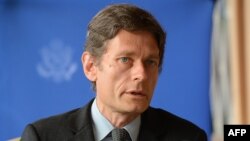A top U.S. diplomat for human rights issues says he is very concerned about a campaign by Russia's government to conceal information from Russian citizens.
In an interview Monday with VOA's Russian service, Assistant Secretary of State Tom Malinowski said he finds it worrisome when people in Russia are given only one side of the story and much is hidden from them.
"And it’s especially tragic when the thing that’s hidden from them is, for example, the death of Russian soldiers in Ukraine," said Malinowski, the assistant secretary of state for democracy, human rights and labor. "When such a basic and fundamental thing is hidden by the government so that people don’t know that their neighbors, their sons, their grandsons, their brothers are going to another country and coming back in body bags and buried in secret graves. That’s a tragic, tragic situation."
VOA's Fatima Tlis, who conducted the interview, asked Malinowski to comment on the Kremlin's efforts to stifle dissenting voices in the country, including human rights activists, journalists and opposition leaders. He said the government has a record of acting with impunity to silence dissent.
Stifling Dissent
"In the most modern countries with the most advanced judicial systems, there are unsolved crimes," Malinowski said. "But in Russia, every crime that has been committed against human rights activists, members of the political opposition, every murder, every killing in recent years against journalists has gone unsolved. In every case, there’s an initial investigation, often a commitment by the leadership that justice will be done, and then either nothing happens or a low-level hit man is prosecuted. And of course, we know that hit men are hired by somebody. There is an author of the crime, and in none of these cases has the author of the crime been brought to justice."
"We do know that Russia has an efficient law enforcement and justice system," he added. "When the leadership wants to find out who is responsible for a crime and to punish that person, that’s something they are very good at in Russia, and clearly a choice has been made at a high level that impunity will be the rule.”
Malinowski criticized a recent move by the Upper House of Russia's parliament to call for scrutiny of 12 foreign non-governmental organizations to determine whether they should be deemed "undesirable" in accordance with a recently passed law. The 12 NGOs are on a so-called "patriotic stop list" consisting of what legislators describe as "foreign or international non-governmental organizations known for their anti-Russian bias."
“I see it as a sign of the government’s deep, deep insecurity and fear and weakness," Malinowski said of the designation. "Who is afraid of organizations that research historical facts or that monitor elections? Who is afraid of a committee against torture? Why would a government be afraid of that unless they want to perpetuate torture? So it’s very, very sad."
Islamic State
On the subject of terrorism, Malinowski made a link between Russia's alleged human rights abuses and the creation by the Islamic State group of a new province in the country's North Caucasus region. He said in every part of the world where the terrorist group has taken root, there has been a sense of disenchantment among the local population.
IS announced the formation of the province last month, a move it had considered making for some time.
"So in Iraq, clearly one of the reasons why ISIS took hold is because the Sunni Muslim population had political and social grievances that were not being addressed by the government in Baghdad," Malinowski said. "The same thing, the atrocities that were being committed every single day in the Syria civil war created a sense of desperation among people that they felt like there’s nothing we can do peacefully to protect ourselves, so that gave groups like ISIS and al-Qaida greater appeal. The same in Nigeria, the same in Somalia, Kenya and many other parts of the world, and absolutely this is the case in Chechnya and the North Caucuses. People have political, economic and social grievances."
